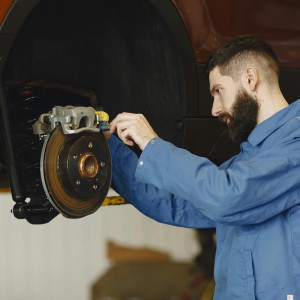The Cost of Ignoring Worn Brake Pads in Fleet Vehicles


Brake pads are a vital part of your fleet's safety system. When they're working properly, they help prevent collisions, reduce wear on other parts, and keep your drivers safe on the road. But once they start to wear out, the risk to both safety and cost rises quickly.
Even a small delay in replacing worn pads might leave your vehicles vulnerable. Keep reading to learn why this is a mistake you can't afford to make.
It's Not Just About Safety
Worn brake pads reduce stopping power. That means longer braking distances and more stress on drivers.
It also makes it harder for fleet managers to guarantee safe deliveries or protect company assets. You may think you're saving time or money by stretching maintenance schedules, but that decision could end up costing far more. Braking issues are one of the leading causes of MOT failures.
If a fleet vehicle fails an MOT due to brake faults, it risks being taken off the road temporarily, which interrupts operations and creates scheduling headaches. If your vehicle already feels sluggish while braking or makes a grinding noise, don't wait. A Fixter brake pads replacement might be exactly what your fleet needs to get back to safe and reliable service.
Brake Damage Doesn't Stop at the Pads
Worn brake pads can lead to other expensive issues.
When the pads are gone, the metal backing plate grinds against the brake disc. This creates friction and heat, which damages the disc itself. Replacing both pads and discs costs significantly more than swapping out pads alone.
It doesn't stop there. Heat damage can spread to the calipers, brake fluid may overheat, and suspension parts could face strain from the increased stopping distances. All these parts are more expensive and time-consuming to replace.
Lost Vehicles Mean Lost Revenue
When a fleet vehicle is off the road for repairs, it's not generating income.
Whether your fleet handles deliveries, transport, or field services, every hour counts. If the root cause is brake pad neglect, you're dealing with an avoidable loss. Delays in replacing pads may also lead to vehicle downtime at the worst moments.
For instance, a van needing urgent attention during a peak delivery window could leave clients frustrated and your business under pressure to explain. Worse still, a serious brake failure might lead to an accident. Beyond the financial hit, there's reputational damage, legal risk, and the impact on team morale.
Final Thoughts
Ignoring worn brake pads isn't just poor maintenance.
It's a financial mistake, a safety hazard, and a risk to your operations. By acting early, you'll avoid higher repair costs, reduce downtime, and make life easier for your drivers. Next time you hear that faint squeal or see the brake warning light, don't put it off.
Take control, protect your fleet, and keep your business moving forward.